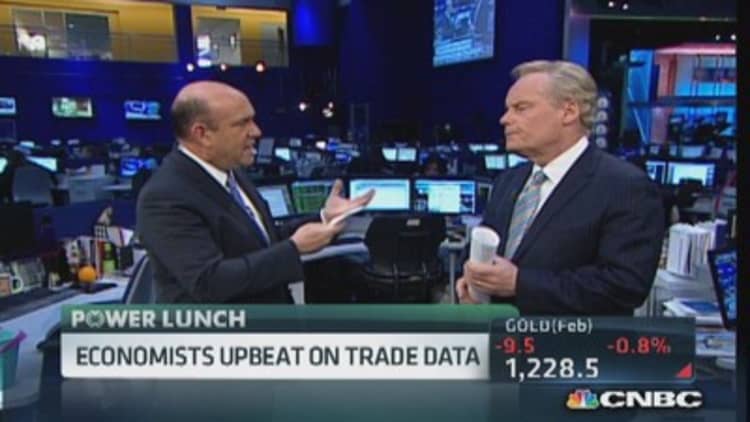U.S. Treasurys
U.S. Treasuries prices rose on Tuesday, with benchmark yields hovering near two-week lows, as traders brushed off a weak $30 billion auction of three-year notes, part of this week's $64 billion in coupon-bearing government debt.
The bond market has stabilized after a dismal 2013 as evidence of cooling in car sales and the services sector raised bets the Federal Reserve would pare its massive bond-purchase program very slowly in coming months.
Bond-market-friendly remarks from two top Fed officials spurred some appetite for Treasuries, which posted a 2.75 percent negative return in 2013.
"The market is in a holding pattern. Fixed investments are doing okay," said Sean Simko, head of fixed-income management at SEI Investments in Oaks, Pennsylvania.
The U.S. central bank said last month it will buy $75 billion in Treasuries and mortgage-backed securities from January, $10 billion less per month than what it had been purchasing in its effort to support the economic recovery.
Fears about the Fed tapering its purchases resulted in the Treasuries market in 2013 recording its third-biggest annual loss in 40 years. Now some investors are reconsidering seeing the Fed move as a shift in its accommodative tilt and reckon the current yield levels are an over-reaction to the tapering.
"I'm paying attention to the tapering. They haven't stopped that. They are still trying to buy bonds to help increase ... growth," said James Barnes, fixed income portfolio manager at National Penn Investors Trust Co. in Wyomissing, Pennsylvania.
On Tuesday, Boston Fed President Eric Rosengren, who is not a voter on the Federal Open Market Committee this year, said the Fed will reduce its current third round of bond purchases "only gradually" because the economy, while improving, remains fragile as price growth remains too low.
Still, the economy has proven resilient. The Commerce Department said on Tuesday the U.S. trade deficit shrank to a four-year low in November on record exports.
San Francisco Fed President John Williams told a bankers group in Phoenix he expects the Fed will likely keep short-term interest rates near zero in the "foreseeable future." He is not a voter on the policy-setting FOMC this year.

The Fed bought $2.81 billion in debt due August 2022 to August 2023 as part of its planned $40 billion purchases in Treasuries in January.
Benchmark 10-year Treasury notes were 6/32 higher in price to yield 2.939 percent, down 2 basis points from late on Monday. In moderate volume, the 10-year yield fell to a two-week low of 2.937 percent earlier Tuesday. It had risen to a near 2-1/2-year high of 3.041 percent last Thursday, according to Reuters data.
The 10-year yield will likely bounce round 3 percent before Friday's December U.S. payrolls report, SEI's Simko said, adding "Unless you see a December payroll print close to 250,000, a substantial move above 3 percent is unlikely." Economists polled by Reuters forecast U.S. employers likely added 196,000 jobs in December after a 203,000 rise in November.
Heavy supply week
Investors, while awaiting the minutes on the Fed's December policy meeting on Wednesday and the payrolls report on Friday, prepared to make room for this week's heavy supply of public and private bonds.
The Treasury Department sold $30 billion of three-year debt and overall demand came in below its recent average, signaling hesitance among investors, analysts said.
The auction "didn't go especially well," Stone & McCarthy Research Associates market analyst John Canavan wrote in a note. A J.P. Morgan Securities survey released on Tuesday showed almost three-quarters of its Treasuries customers said on Monday they were neutral on Treasuries, or holding longer-dated government debt equal to their portfolio benchmarks. A week ago, 65 percent said they were neutral.
This level of investor caution might be an omen for the rest of the week. The government plans to sell $21 billion in 10-year notes on Wednesday and $13 billion in 30-year bonds on Thursday.
Competing for investors' cash will be an expected flood of investment-grade corporate bonds. Wall Street underwriters forecast that companies plan to sell $90 billion to $100 billion in high-grade debt in January, according to IFR, a unit of Thomson Reuters.
—By Reuters

